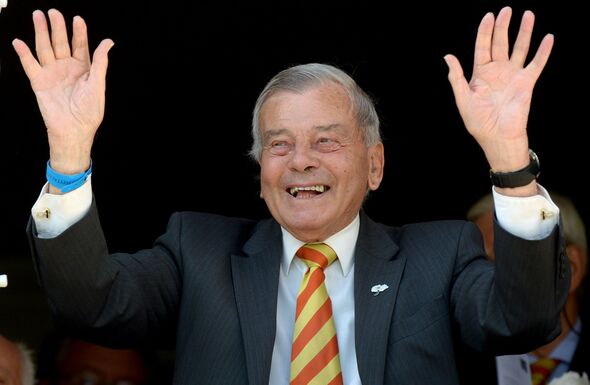Science
Cricket Legend Dickie Bird Passes Away at 92, Leaving a Legacy

Harold “Dickie” Bird, the revered cricket umpire known for his unique personality and exceptional career, has passed away at the age of 92. Bird’s impact on the sport extended beyond his officiating, making him a beloved figure in cricket history. His remarkable journey included officiating in 66 Test matches and 69 One Day Internationals, with notable appearances in three World Cup finals.
Born in April 1933 in Barnsley, Yorkshire, Bird grew up in a coal mining community, where his father, James Bird, worked tirelessly to ensure his son would pursue a different path. “You will play sport for your living,” his father often told him. This encouragement set Dickie on a trajectory toward a life in sports, where he initially excelled in football before transitioning to cricket.
Bird’s cricketing aspirations were realized when he joined Yorkshire County Cricket Club, and he achieved a career-best score of 181 not out during his time there. Despite his potential, he faced challenges, including a knee injury that curtailed his football career. Ultimately, he retired at the age of 32 after a modest but impactful first-class career, averaging 20.71 runs.
In 1970, Bird transitioned to umpiring, a decision that would define his legacy. He officiated for 25 years, known for his fairness and distinctive style. He famously said, “I always said when I got on to the first-class umpires list that I was going to smile and sign every autograph for every kid.” His approachable demeanor endeared him to players and fans alike.
Bird’s career was marked by memorable incidents that showcased his character. He once had to pause a match due to water bubbling up from the drains at Headingley, and he stopped play at Old Trafford in 1995 when sunlight reflected off neighboring greenhouses. His light-hearted approach and ability to diffuse tension on the field made him a respected figure among players.
The cricket community celebrated Bird not only for his umpiring skills but also for his warmth and eccentricities. Former Prime Minister David Cameron described him as a “friend,” while broadcaster Piers Morgan hailed him as “the greatest and most legendary umpire in cricket history.” Yorkshire County Cricket Club commemorated his contributions, emphasizing his integrity and humor.
Throughout his life, Bird maintained a close relationship with the British royal family. He had numerous meetings with Queen Elizabeth II, who expressed admiration for his work. Bird fondly recalled a lunch he shared with the Queen in 1990, stating it was the best day of his life. His unique connection to the monarchy further solidified his status as a national treasure.
Bird’s legacy also includes his autobiography, which sold over a million copies, illustrating his widespread appeal. Following a stroke in 2012, he continued to engage with the cricket community as the president of Yorkshire Cricket Club from 2014 to 2016, during which the club won back-to-back County Championships.
Despite his passing, Bird’s influence on cricket remains indelible. His joyous spirit, dedication to the sport, and legendary status ensure that he will be remembered by fans and players alike for generations to come. As the cricketing world mourns the loss of Dickie Bird, they also celebrate the remarkable life of a true icon who brought joy and laughter to the game.
-

 Entertainment3 months ago
Entertainment3 months agoAnn Ming Reflects on ITV’s ‘I Fought the Law’ Drama
-

 Entertainment4 months ago
Entertainment4 months agoKate Garraway Sells £2 Million Home Amid Financial Struggles
-

 Health3 months ago
Health3 months agoKatie Price Faces New Health Concerns After Cancer Symptoms Resurface
-

 Entertainment3 months ago
Entertainment3 months agoCoronation Street’s Carl Webster Faces Trouble with New Affairs
-

 Entertainment3 months ago
Entertainment3 months agoWhere is Tinder Swindler Simon Leviev? Latest Updates Revealed
-

 Entertainment4 months ago
Entertainment4 months agoMarkiplier Addresses AI Controversy During Livestream Response
-

 Science1 month ago
Science1 month agoBrian Cox Addresses Claims of Alien Probe in 3I/ATLAS Discovery
-

 World2 weeks ago
World2 weeks agoBailey Announces Heartbreaking Split from Rebecca After Reunion
-

 Health4 months ago
Health4 months agoCarol Vorderman Reflects on Health Scare and Family Support
-

 Entertainment4 months ago
Entertainment4 months agoKim Cattrall Posts Cryptic Message After HBO’s Sequel Cancellation
-

 Entertainment3 months ago
Entertainment3 months agoOlivia Attwood Opens Up About Fallout with Former Best Friend
-

 Entertainment2 weeks ago
Entertainment2 weeks agoCoronation Street Fans React as Todd Faces Heartbreaking Choice





















